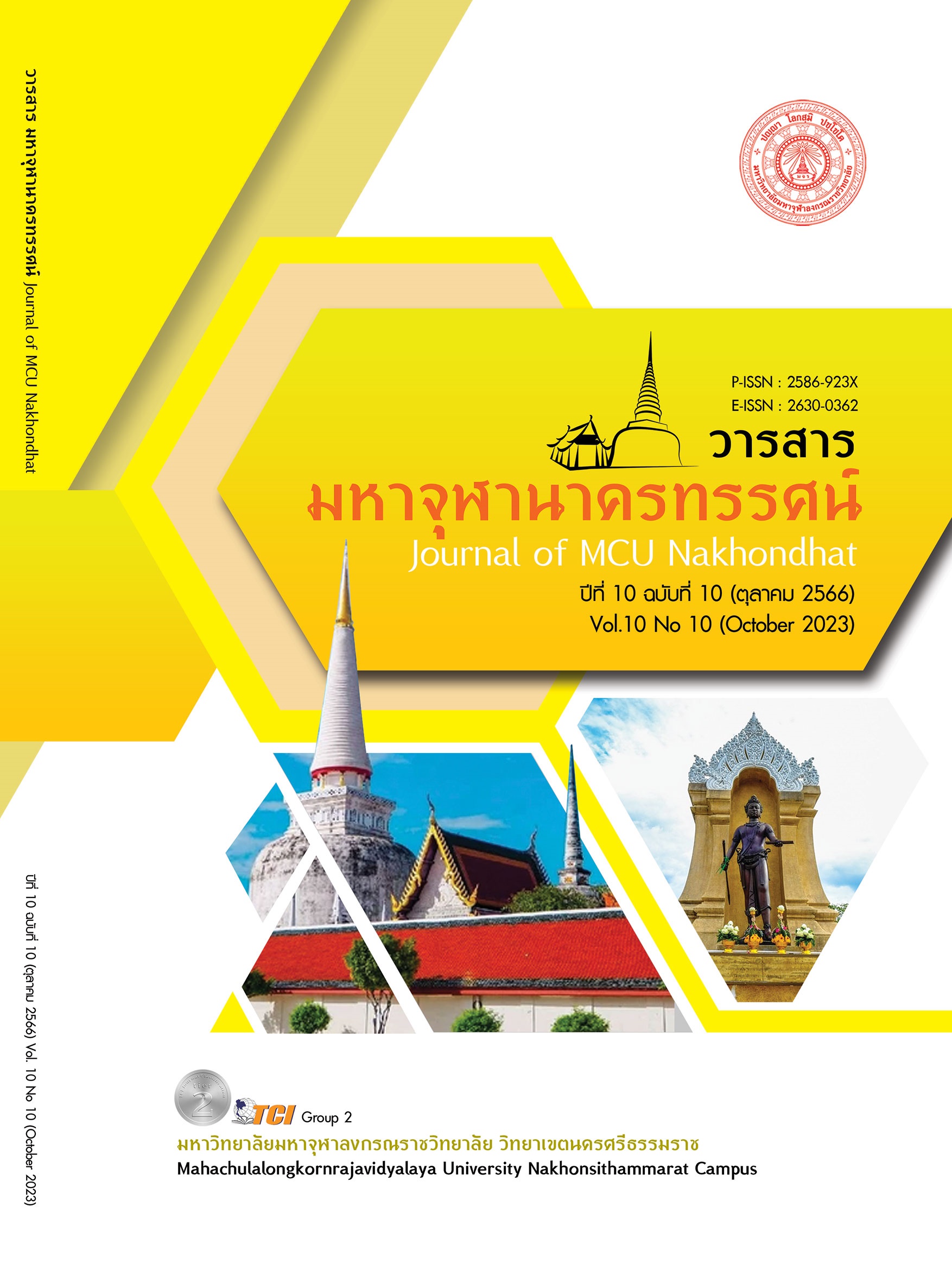MODEL FOR THE DEVELOPMENT OF TEACHER PROFESSIONAL LEARNING COMMUNITY TO ENHANCE THE INSTRUCTIONAL COMPETENCE OF ELEMENTARY SCHOOL STUDENT TEACHERS
Main Article Content
Abstract
This research aimed to 1)develop a teacher professional learning community development model to enhance the instructional competence of elementary school student teachers, 2)test the teacher professional learning community development model, and 3)study good practices on teacher professional learning community development. This research conducted quantitative and qualitative research methods. The research samples consisted of 31 student teachers, Silpakorn University, first semester, Academic Year 2022. The research instruments comprised a form for investigating the theoretical reasonableness and feasibility of the model, an instructional competence evaluation form, a satisfaction survey form and focus group discussion questions. The data analysis was conducted using mean (), standard deviation, (S.D.), and content analysis. The research findings were as follows: 1) The teacher professional learning community development model to enhance the instructional competence of elementary school student teachers consisted of 6 components: 1) name of model, 2) principles, 3) objectives, 4) process, 5) supporting factors, and 6) results of model; 2) Model trial – 2.1) Overall, the student teachers’ instructional plan development competence was at a high level (
= 4.15, S.D. = 0.58) and instructional competence was at a high level (
= 4.10, S.D. = 0.63) and 2.2) Overall, the satisfaction was at the highest level (
= 4.79, S.D.=0.42); and 3) Good practices on teacher professional learning community development - The development of instruction through the model process ensuring achievement and tangible outcomes involved reinforcing factors, including: 3.1) Knowledge of elementary school student teachers, 3.2) Skills and competence of elementary school student teachers, and 3.3) Stakeholder engagement.
Article Details

This work is licensed under a Creative Commons Attribution-NonCommercial-NoDerivatives 4.0 International License.
References
ชาริณี ตรีวรัญญู. (2560). การสร้างชุมชนแห่งการเรียนรู้เชิงวิชาชีพด้วยการพัฒนาบทเรียนร่วมกัน : แนวคิดและแนวทางสู่ความสำเร็จ. วารสารครุศาสตร์, 45(1), 299 - 319.
ทิศนา แขมมณี. (2550). ศาสตร์การสอน. (พิมพ์ครั้งที่ 6). กรุงเทพมหานคร: ด่านสุทธาการพิมพ์.
บำรุง ป้องนาทราย. (2564). การพัฒนารูปแบบชุมชนแห่งการเรียนรู้ทางวิชาชีพเพื่อส่งเสริมความสามารถ จัดการเรียนรู้ที่เน้นผู้เรียนเป็นสำคัญตามแนวปฏิบัติสู่ผลสัมฤทธิ์ขั้นสูง (High Impact Practices) โรงเรียนหนองโนประชาสรรค์. วารสารชุมชนแห่งการเรียนรู้วิชาชีพครู, 1(1), 45 - 60.
ปรณัฐ กิจรุ่งเรือง และอรพิณ ศิริสัมพันธ์. (2561). ชุมชนแห่งการเรียนรู้เชิงวิชาชีพครู. กรุงเทพมหานคร: M&N Design Printing.
พิมพันธ์ เดชะคุปต์ และพเยาว์ ยินดีสุข. (2561). การจัดการเรียนรู้ในศตวรรษที่ 21. กรุงเทพมหานคร: โรงพิมพ์แห่งจุฬาลงกรณ์มหาวิทยาลัย.
พิรุณ ศิริศักดิ์. (2562). การวิจัยและพัฒนาหลักสูตรอิงอัตลักษณ์นักเรียนที่บูรณาการการพัฒนาบทเรียน ร่วมกันผ่านชุมชนแห่งการเรียนรู้ทางวิชาชีพ: กรณีศึกษาหลักสูตรกุลสตรีราชินีบน. กรุงเทพมหานคร: โรงเรียนราชินีบน.
มาเรียม นิลพันธุ์. (2555). วิธีวิจัยทางการศึกษา Research Methodology in Education. (พิมพ์ครั้งที่ 6). นครปฐม: โรงพิมพ์มหาวิทยาลัยศิลปากร.
รัฐธรรมนูญแห่งราชอาณาจักรไทย. (2060). ราชกิจจานุเบกษา เล่ม 134 ตอนที่ 40ก 6 เมษายน 2560.
วรนันท์ ขันแข็ง. (2565). รูปแบบการพัฒนาครูโดยใช้ชุมชนการเรียนรู้ทางวิชาชีพเพื่อส่งเสริมการจัดการเรียนรู้เชิงรุก โรงเรียนมัธยมวัดดุสิตาราม. วารสารการวิจัยการศึกษาขั้นพื้นฐาน, 2(1), 135 - 157.
วรลักษณ์ ชูกำเนิด, และคณะ. (2560). รูปแบบชุมชนการเรียนรู้ทางวิชาชีพครูสู่การเรียนรู้ในศตวรรษที่ 21 บริบทโรงเรียนในประเทศไทย. วารสารหาดใหญ่วิชาการ, 12(2), 123 - 134.
สาขาวิชาการประถมศึกษา คณะศึกษาศาสตร์ มหาวิทยาลัยศิลปากร. (2564). ปัญหาในการฝึกประสบการณ์ วิชาชีพครูของนักศึกษาครูประถมศึกษา. ใน เอกสารรายงานการสาขาวิชาการประถมศึกษา, ครั้งที่ 5/2564. มหาวิทยาลัยศิลปากร
สำนักงานเลขาธิการสภาการศึกษา. (2560). แผนการศึกษาแห่งชาติ พ.ศ. 2560 - 2579. กรุงเทพมหานคร: บริษัทพริกหวานกราฟฟิกจำกัด.
Bautista, A., & Ortega-Ruíz, R. (2551). Teacher professional development: International perspectives and approaches. Psychology, Society and Education, 7(3), 240 - 251.
Caine, G., & Caine, R. (2010). Strengthening and Enriching Your ProfessionalLearning Community: The Art of Learning Together. Alexandria: ASCD.
Kurth-Schai, R. (2019). Professional Learning Community in America: Workshop. Nakhon Pathom: Silpakorn University.
Saastra Laah - O. et al. (2017). What Teachers Have Learned through Using Classroom Video?. World Association of Lesson Studies 2017. Japan: WALS, Nagoya University.
Sato, M. & Akito, K. (2017). School as Learning Community in Asia. Plenary Symposium. 24 November. Japan: WALS, Nagoya University.
UNESCO. (2016). The United Nations Educational, Scientific and Cultural Organization (UNESCO). France: UNESCO.
White, A. (2004). The lesson study approach to implementing change, Paper presented at SEAMEO - UNESCO Education Congress and EXPO Secretariat. Bangkok: EXPO Secretariat.
Yutaka, O. (2018). What’s All the Fuss about Lesson Study: As a Japanese Teacher’s Culture. Tokyo: Kanto - Gakuin University.


